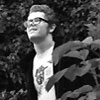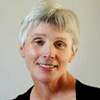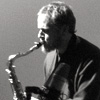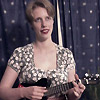Jack Body talks to Douglas Lilburn (1975)
This is a transcript of an audio interview between Jack Body and Douglas Lilburn in 1975. While we have made every effort to accurately transcribe the audio there may be minor variations from the original recording.
Jack: Can you tell me, when you have to fill in your tax form, under occupation do you put ‘composer’?
Douglas: No, in fact I don't. [laughs] I would use a word like musician, which seems to have a general coverage of what I do, and the word is readily understandable to anybody – even tax collectors.
Jack: Have you never used the term composer?
Douglas: Oh yes, I'm sure I did, especially in early years because I think when one is young, one takes oneself much more seriously, and it seemed quite a natural thing to do then.
Jack: Did you find at any point that you felt that you had to assert yourself as a composer, as a valid profession?
Douglas: It was, perhaps a bit of a strange occupation when I began it here; but on the other hand, as a student in London it seemed a perfectly natural thing to be. And later, in Christchurch, there was a large group of people who took themselves quite seriously as painters, as writers, as poets, and musicians, and so it seemed to me quite a natural thing to set up business as a composer. All those writers and painters, I knew, listened readily to music and could talk very intelligently about it, and in fact they gave me a lot of encouragement at that time, and of course I was learning a tremendous amount from them, too.
Jack: I know that you have a large collection of books, and also paintings, and your interests are very wide outside musical activities. Is it possible that you could have been tempted into another activity or occupation?
Douglas: Oh, I suppose so. In fact, I went to the University to study to be a journalist, but that enthusiasm didn't last very long. And when you say I have a collection of paintings, I don't really collect them. I just happen to have known painters, and some of these arrive... well, one of them, in fact, arrived in exchange for two guitar pieces one Christmas. And as for books, of course I began to read very early and have read all my life.
Jack: What do you think are the responsibilities of being a composer?
Douglas: I think, by and large, like those of being anything else. One gains a lot during the course of a career, and certainly I think you have to return what you were given. This is why people in professions do a certain amount of teaching, I think. This is a way of maintaining a tradition – that you both get from it and give back to it constantly. As for the wider role of a composer in society, this is a very difficult field to talk about, I would think. Some composers seem to be purely interested in their music, but even a composer like [Benjamin] Britten has a very strong social conscience, obviously.
Jack: How far do you identify yourself with the music itself, particularly in the making of a piece in the composition? And afterwards do you feel that somehow that is a part of you or something apart from you?
Douglas: For me it's both of those things. Inevitably it's part of me, and yet when the piece is done I can look at it fairly objectively, I think. And in the actual making of it, again, naturally one identifies a lot with it, but many of the processes are partly subconscious, I think. In fact, you will very often see relationships of materials in a work long after you've written it. [laughs] They become apparent later, and yet they obviously were done quite deliberately.
Jack: Yes. Has your method of working always been the same or has it changed?
Douglas: I think it has changed; that is to say, composing in fact becomes much more difficult for me. It did become progressively more difficult because in student years I think I was pretty innocent about what I was doing, and it was quite natural just to write a work spontaneously without thinking too hard about it. But nowadays, if you begin with an idea, and particularly if you're using serial technique, of course you have to plot the whole scheme of that work very thoroughly before you can begin to – I won't say use your imagination on it because the planning of it is also bound up with imagination – but you certainly have to survey your whole field of work before you get down to writing it.
Jack: Many people will know you through your music without knowing you personally. Does that ever produce surprises? Perhaps somebody's heard a piece and then meets you and discovers something different from what they expected.
Douglas: Ah, I'm not really aware of this I don’t think. [laughter]
Douglas: Occasionally some very nice things do come back from people who I've never met, from other parts of the world, even, who react, in a way that pleases me, to sounds of mine that they've heard. It's good to be able to communicate in that way, I think.
Jack: So, music for you is basically a communication of some kind.
Douglas: Oh, always I think it is that.
Jack: And yet, before you were talking about the work itself as something which you work out in its own terms, and that you aren't concerned for reputation, say.
Douglas: But I don't think reputation has anything to do with the design of a piece of music, its form or logic, anything of that kind, or the skill with which it's put together. This is intrinsic to the piece, surely.
Jack: Perhaps what I was trying to say was you aren't concerned with your audience in the process of writing.
Douglas: In some cases, yes; especially if one is writing for a particular occasion, one has to be conscious of the kind of audience. But then it's always a matter of striking a balance between what you want to say and the way you may want to say it for that occasion.
Jack: I remember 10 years ago in a series of programs, Ron Tremain made a comment that he saw a paradox in the fact that he felt that you, as a man, were in some ways inhibited, and yet your music was not. Do you think perhaps that your music expresses a part of yourself which you don't express as a person?
Douglas: This could easily enough be true, I suppose. I find that a rather difficult one to answer, indeed. [laughter]
Douglas: In a sense, the music always has an objectivity, as well as being a subject of expression. And perhaps to communicate in music is a very natural thing for me, whereas growing up as I did in a rather solitary way, the simple business of talking sometimes is not something that comes naturally to me. [laughs]
Jack: With your transition to electronic music was that an inevitable process, and was it an easy process?
Douglas: No, I don't think it was either inevitable or easy. It simply happened as a result of a confluence of many things: partly the fact that we began to hear about this new medium, we were interested in it, and felt that New Zealand should have some station in a University where it could be explored and where it could be taught, finally. And as a medium, of course, as soon as I met it, it simply fascinated my ears. And the whole technique involved with it is, again, fascinating, because it's rather more like painting in a sense that you get your sound result immediately back from whatever you do, and if it doesn't happen to come out just as you want it you simply adjust controls and do it again, like doing another brushstroke, I suppose.
Jack: Yes. Yes. What was your first encounter with it, in fact?
Douglas: Probably to hear Deutsche Grammophon records, I think. But in a practical way, what I did was to borrow a little Sony portable and an oscillator and have them wired into the system of the music room, and made some raucous noises through the weekend. [laughter]
Jack: I'm always fascinated by your anecdotes, and wonder if you could think of particular musical encounters that you had which were important for you – astonishing, revelationary, perhaps.
Douglas: I suppose the most fundamental one would be when I was at school at Waitaki, in the Hall of Memories. There was a very good pianist there, Louise Carroll, and she played the Mozart “Coronation Concerto” with George Wilkinson accompanying on the organ. And after this she played the “G minor Ballade” of Chopin. This was the first time I'd heard this piece and it was a revelation, in fact, at that stage, and I think possibly this was the moment when I decided I was going to be a musician.
Jack: What sort of echoes did that piece have? Does it still...? [interrupted]
Douglas: Oh, marvelous! Yes, yes.
Jack: [laughing] Every time you hear it, do you go back to that occasion?
Douglas: I try not to hear these things too often, because you can't do that.
Jack: Many critics or commentators have talked about the New Zealandness of your music, and of this idea of a New Zealand identity, but somehow that has all become in the past. Can you look back more objectively and see, in New Zealand music or the present developments, even, of New Zealand music, what is its identity or what are its characteristics?
Douglas: Well, I think the scene is changing rapidly of course, all the time. The idea of New Zealandness, possibly in my own work, would stem partly from my use of New Zealand poets, settings of them. But the main characteristic of music here, I think, is its eclecticism, and this seems to be very natural for a remote small country that we have to keep our antennae tuned to whatever is going on in the larger world. And until we have a tradition of our own – a strong one – we necessarily listen to everything, select what seems appropriate, and reject other things. There, curiously, is a strong shift at the moment from European influences to Polynesian and Oriental influences, which seems to me part of our existence in the Pacific world, here.
Jack: Recently, at the Composer's Conference in Hamilton, a paper was given to composers, the idea that perhaps they should be more aware of Polynesian music, and make use of it.
Douglas: This was Peter Crowe's paper, was it?
Jack: That's right.
Douglas: Yes, I've heard of it, but I haven't been able to see it yet, and I distrust immediately the idea that one should make use of something which is part of another culture. In fact I think this is what Alfred Hill possibly set out to do around about 1900, to make use of Maori tunes. It was the fashionable thing to do then, but that didn't develop, of course. And what I've learnt of traditional Maori music makes me very afraid of trying to make use of it in any way at all. It's something I find rather difficult to understand, although I'm fascinated by it. I think it would need a much greater fusion of our two cultures here before that music could be validly put into European media. Curiously, what has happened is a fusion in terms of painting, and first of all of painting, I think, because there are very good Maori painters now; and very good Maori writers, as well.
Jack: This question of a New Zealand identity, or a New Zealand sound, is it not possible that a clue to this will lie in the electronic medium – that the sound environment which is in this country is something that is uniquely ours?
Douglas: I think that's a very good point, and I notice that every composer who comes into the studio is fascinated by natural sounds, and several of them have a distinct preference for certain sounds like sounds of the ocean or of running water, and curiously, things like cicadas, which are in our ears through the summer.
Jack: Are you interested in using music for – how can one say it – moral or political reasons?
Douglas: Not deliberately, I think. I have occasionally written a piece like an electronic piece called “Poem in Time of War”, which obviously has political connotations, I suppose. It is a sort of protest piece.
Jack: What is your view of a composer like Luigi Nono, who deliberately chooses to use music as a vehicle for revolution?
Douglas: I would admire him very much for this, and for the fact that he's also a very good musician. And I think this stems very much from his political context, as it were, where the pressures are very strong. They seem to me not so strong in a country like this. Not at the moment, anyway.
Jack: I know you are very conscious of political movements throughout the world, particularly the freedom of the individual, and you make protests on behalf of specific cases.
Douglas: In the cases you mention, they've been very specific cases – one in Korea, one in Greece – of composers who are simply imprisoned under very harsh circumstances and deprived of their right to exercise their talent, as well as deprived of their individual freedom. In this case I think the only thing one can do is to organize a protest with signatures. And in fact, this sort of protest has been very effective in getting release of these people. If sufficient world attention is focused on this incident, then very often one can achieve something in this way, and it seems to me that this is the least one can do for a colleague.
Jack: Freedom seems to function on many levels, and it can come down to a personal level of being free within one's own environment to do things which one wants to. In your life, for instance, you have been always working in a University. I expect that initially there was no alternative way to survive.
Douglas: There might have been, because I had several years of being an unemployed composer, as it were, and just doing odd jobs like press criticism and a few pupils, but being, in a sense, very free. And I was able to do this at what seemed to me a good age to do it. But I think that kind of freedom can easily go to seed, perhaps.
Jack: What do you mean by that? [laughter]
Douglas: That one has to accept life in a larger sense; one has to assume responsibilities; one has to give back a good deal of what one has gained. And in my case I think I've been very lucky to be able to do this partly through teaching, and at the same time keep a relative amount of freedom for my own work.
Jack: Yes. What are the fundamental freedoms which you value?
Douglas:All the freedoms that people in this country enjoy, for one, and in my own case, I think particularly freedom to be able to write the kind of music I would like to write. I don't know how I'd endure to be in a country where music was politically controlled, for instance.
Jack: Yes.









